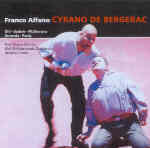Franco Alfano (1876-1954) is known today mostly for having finished Puccini’s Turandot, a feat for which he has gathered almost universal scorn. It is hard to believe how well-respected and often-played at least one of his operas was: Resurrezione, the opera in question, was performed more than 1,000 times in Italy during the 1950s. Cyrano was composed between 1933 and 1935, and it has much to recommend it. The orchestration is lush and frequently reminiscent of other composers: Puccini is here, as are Richard Strauss, Korngold, and Debussy.
But Alfano’s own voice may be precisely that–a melting pot of late Romanticism–and it can be fascinating. There are longueurs to be sure, and unfortunately the brief (18-minute) first act is one of them: while it both sets up and advances the plot, there’s very little musically to latch onto. By the time Cyrano woos Roxane in Christian’s place, which unfolds during an exquisite, hypnotic, ecstatic final quarter-hour of the second act, we are tempted to return to the beginning with a fresh ear.
In fact it is during the love music that Alfano’s greatness comes across most vividly. That’s not to say that the military scenes are not effective; they just don’t have the allure of the tender moments. (This work can be compared to Gounod’s Roméo et Juliette and Massenet’s Werther insofar as they can all be seen as long love duets, often interrupted.) I suspect that repeated listenings will open up even more delights–by my third listen I found myself appreciating certain sections I’d found tedious the first couple of times.
The best thing about this set is Markus Frank’s leadership and the performances by the Kiel Opera Orchestra and Chorus. The recording is technically good enough for us to value the precision of their playing and singing and to take note of Alfano’s colorful, rich orchestration. And Frank moves the drama along naturally; even during the many back-and-forth recitative-like sections you sense that the pacing is just right. As drama, it always works.
Tenor José Luccioni and Maria Caniglia were the Cyrano and Roxane (under Tullio Serafin) at the world premiere in Rome. It must have been exquisite. Ramon Vinay occasionally sang the title role as well. And that’s the problem here: Just as Cyrano is supposed to write and recite beautifully enough to make Roxane adore him through words and sound, so should the sheer sound of the tenor hero enthrall. The role is difficult, alternately heroic and lyrical, and Roman Sadnik is temperamentally up to the task and he sings all the notes, but his sound is hard and unappealing and it tires and taxes the ear. The same might be said of Manuela Uhl’s Roxane–it is committed and intelligent, but only intermittently nice to listen to. The rest of the large cast is good enough, but I can’t help feeling that all this performance needed to succeed was two genuinely beautiful voices (an unstrained Alagna and Renée Fleming?) and we would have been bowled over. At any rate, despite its flaws this recording deserves to be heard, and the opera certainly deserves exploration.
































